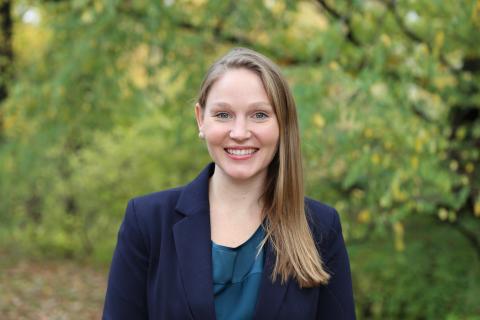From Bank of America to Teach for America: Dr. Kaitlin Anderson’s Journey to Lehigh

Although she’s spent most of her professional life focused on education, Dr. Kaitlin Anderson’s left college in 2009 with a degree in commerce and economics and headed for a job with Bank of America.
But after three years as a senior financial analyst, she realized it wasn’t working.
“I enjoyed a lot of the analytical aspects of my job in finance, and there were certainly things about that that I liked,” Anderson says. “But I always kind of felt like something was missing, in terms of giving back to the community, or feeling like I was doing something that was really valuable.”
She wound up working with Teach for America, teaching high school math in Fordyce, Arkansas. Anderson hadn’t seen herself in this position but wound up loving the experience.
It was a great way to learn about the educational system, but also an eye-opening experience. Anderson began thinking about the policies that make it difficult to provide a quality education, particularly in the types of places Teach for America tends to serve.
Looking back, she can’t point to a single moment that made her say “I need to investigate where inequality comes from.”
“I need to investigate where inequality comes from.”
Dr. Kaitlin Anderson, assistant professor, educational leadership
It was a slow realization, a lot of little moments.
“It was something like walking into a classroom and realizing that all of the students in an AP classroom look the same, and all the students in a ‘regular’ classroom look a different way,” Anderson says. “Or it’s something about realizing that certain families have resources and social and cultural capital that others might not, and they might get certain advantages because of that.”
After her time with Teach for America, Anderson began graduate work at the University of Arkansas, where she earned her PhD in education policy.
Her research looks at issues of equity and opportunity in schools and school systems, with a specific focus on using administrative data to examine local and state policies.
A bulk of her work has homed in on assessing disproportionalities in discipline for underreported groups and how those discipline policies impact crucial student outcomes.
In 2019, she published two papers on the connections between suspensions and student outcomes. While schools have begun to turn away from the concept of out of school suspensions as a disciplinary measure, it’s important that educators figure out the appropriate alternative.
“There’s this idea that out of school suspension is bad, and if you get rid of it, it’s going to fix everything, but what you replace it with is very important.”
In school suspension might be a better alternative to out of school suspensions, but they still have their own negative consequences.
“We need to be thinking about preventive and restorative practices as well,” Anderson says.
Preventive practices are those that aim to restore the relationship broken by misbehavior, with the idea that there’s an opportunity for the student to learn from the incident, rather than just taking a punishment.
It’s being embraced in several schools, but Anderson notes that there haven’t been many studies into the practice.
One study, conducted by the RAND Corporation in Pittsburgh, showed promising findings. Teachers reported an improved climate in schools following the implementation of restorative practices.
Suspension rates among black and low-income students went down, reducing the disparities in rates of suspension between black and white students and lower-income and higher-income students.
However, academic outcomes did not improve in schools that adopted restorative practices, and in fact worsened for middle school students.
After leaving the University of Arkansas, Anderson spent two years as a post-doctoral research associate with the Education Policy Innovation Collaborative at Michigan State University.
She’ll continue her research work at Lehigh, and says she chose the school in part because of the “close cooperative environment,” and in part because research is a clear priority here.
“And I don’t just mean research for the sake of research,” Anderson says. “You can really tell there’s an effort to translate research into practice and provide programs, rather than just conduct research in a vacuum.”
In addition to her research into student discipline, Anderson is also interest in school choice policies and teach labor market reforms, particularly in examining how those policies affect students and their access to high quality teachers and schools.
“We’re working in a system that tends not to compensate for the demand for certain types of teachers in certain types of schools,” she says. “If they’re all paid the same way, it makes it harder to attract teachers that are in those high shortage areas.”
While at Lehigh, Anderson says she wants to look at how policy might either advance or hinder equity in schools. She hopes to conduct research that helps policymakers and educators make informed decisions aimed at creating a more equitable place to learn.